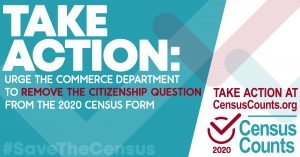2020 Census Public Comment Deadline: August 7
August 2, 2018The National Assembly has opposed the addition of an untested citizenship question to the 2020 census since it was announced. In April, we partnered with the U.S. Census Bureau to ensure a fair and accurate count, which safeguards equitable representation and the appropriate allocation of federal funds for over 300 financial assistance programs that help build well-being.
Low-Income Families are Historically Undercounted
Low-income families are traditionally undercounted in the decennial census for a variety of reasons. These families are much more likely to live in communities that are hard to count, where residents making below 200% of the Federal Poverty Level account for nearly half the population. Likewise, low-income families typically rent instead of owning homes, making them more likely to move during the census. Further, low-income renters who allocate a larger proportion of their income toward rent are more likely to be evicted, and may not be counted in the census should they fail to update their address.
Because low-income households are disproportionately comprised of people of color, these populations are more likely to be undercounted. According to the Census Bureau’s 2012 post-enumeration survey, the 2010 census undercounted 2.1% of the black population and 1.5% of the Hispanic population while over-counting non-Hispanic white population by 0.8%.
The 2020 census will be the most technologically advanced to date, as it is the first to rely primarily on the internet for data collection. However, as the income of a family drops, so too does that household’s likelihood of having internet access. An increased reliance on internet responses will lead to an inaccurate count of families without internet access.

A Citizenship Question Will Lead to a Significant Undercount
The inclusion of a citizenship question would make it even more difficult to achieve an accurate count. Although the citizenship question was not included in the practice run of the census conducted in Providence, RI, the administration announced the addition just two days after the test survey was distributed, prompting many residents there to avoid participation. Many families believe that Immigration and Customs Enforcement (ICE) would use their response to the citizenship question as a means to target household members who may be undocumented. According to the Bureau’s own research, respondents from multilingual focus groups expressed these same concerns.
Another undercounted demographic – immigrant families with young children – are especially at risk. It is estimated that 5.9 million young children live in “mixed-status families” – families that include at least one undocumented immigrant. Fears over the possible deportation of parents or other family members will likely depress the response rate, leading to an undercount of young children, which will resulting in a loss of federal funding to state with large immigrant populations for essential programs like Head Start and the Children’s Health Insurance Program (CHIP).
Submit Your Comments
The Leadership Conference Education Fund has developed a public comments toolkit to help the sector explain the importance of a fair and accurate census. The National Assembly encourages individuals and organizations to weigh in before the 60-day public comment period closes on August 7th. For additional information, please contact Marie Camino at mcamino@nassembly.org.

